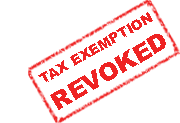
On October 15, 2010, the Internal Revenue Service began revoking the tax exempt status of hundreds of thousands of non-profit organizations.
This unprecedented mass revocation has its roots in two laws enacted by Congress in 2006. The first requires small non-profits previously not required to file to submit an annual return. The second requires the IRS to revoke the tax exempt status of any organization that fails to file an annual return for three consecutive years. Together, these two laws mean that organizations that had never been required to file an annual return in the past not only suddenly had to file, but lost their exempt status if they did not.
If your organization’s tax-exempt status is automatically revoked, it is no longer tax-exempt under federal law, and may be required to file one of the following federal income tax returns and pay any applicable income taxes and penalties:
- Form 1120, U.S. Corporation Income Tax Return, due by the 15th day of the 3rd month after the end of your organization’s tax year; or
- Form 1041, U.S. Income Tax Return for Estates and Trusts, due by the 15th day of the 4th month after the end of your organization’s tax year.
In addition, a section 501(c)(3) organization that loses its tax-exempt status cannot receive tax-deductible charitable contributions and will not be listed in Publication 78, Cumulative List of Organizations described in Section 170(c) of the Internal Revenue Code of 1986.
If your organization's tax exempt status has been revoked, you must now begin the entire application process over in order to regain 501(c)(3) status. KNPUSA can assist you in regaining your status retroactive to your revocation date.
If you are unsure of your current tax exempt status, click here for a free status check.
